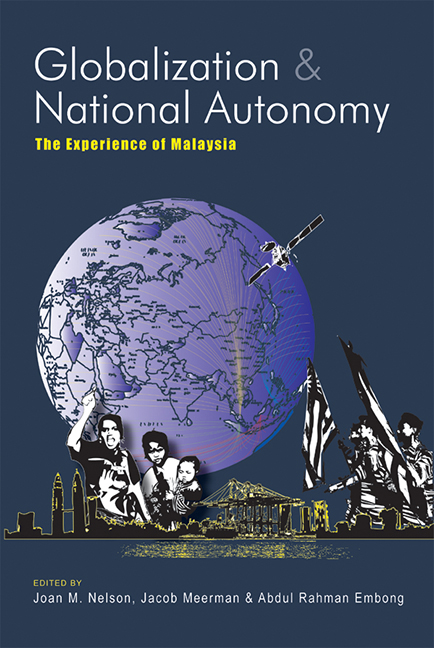Book contents
- Frontmatter
- Contents
- List of Abbreviations
- List of Tables and Figures
- Preface
- Contributors
- Chapter 1 Introduction
- Chapter 2 Developmentalist State in Malaysia: Its Origins, Nature, and Contemporary Transformation
- Chapter 3 The Look East Policy, the Asian Crisis, and State Autonomy
- Chapter 4 The Malaysian Success Story, the Public Sector, and Inter-ethnic Inequality
- Chapter 5 Poverty Eradication, Development, and Policy Space in Malaysia
- Chapter 6 Trade Liberalization and National Autonomy: Malaysia's Experience at the Multilateral and Bilateral Levels
- Chapter 7 Malaysia's Education Policies: Balancing Multiple Goals and Global Pressures
- Chapter 8 Malaysia's Healthcare Sector: Shifting Roles for Public and Private Provision
- Chapter 9 Globalization, Islamic Resurgence, and State Autonomy: The Response of the Malaysian State to ‘Islamic Globalization’
- Chapter 10 The National Culture Policy and Contestation over Malaysian Identity
- Chapter 11 Conclusions
- Index
Chapter 4 - The Malaysian Success Story, the Public Sector, and Inter-ethnic Inequality
Published online by Cambridge University Press: 21 October 2015
- Frontmatter
- Contents
- List of Abbreviations
- List of Tables and Figures
- Preface
- Contributors
- Chapter 1 Introduction
- Chapter 2 Developmentalist State in Malaysia: Its Origins, Nature, and Contemporary Transformation
- Chapter 3 The Look East Policy, the Asian Crisis, and State Autonomy
- Chapter 4 The Malaysian Success Story, the Public Sector, and Inter-ethnic Inequality
- Chapter 5 Poverty Eradication, Development, and Policy Space in Malaysia
- Chapter 6 Trade Liberalization and National Autonomy: Malaysia's Experience at the Multilateral and Bilateral Levels
- Chapter 7 Malaysia's Education Policies: Balancing Multiple Goals and Global Pressures
- Chapter 8 Malaysia's Healthcare Sector: Shifting Roles for Public and Private Provision
- Chapter 9 Globalization, Islamic Resurgence, and State Autonomy: The Response of the Malaysian State to ‘Islamic Globalization’
- Chapter 10 The National Culture Policy and Contestation over Malaysian Identity
- Chapter 11 Conclusions
- Index
Summary
Let us focus on developing this country. God willing, we will achieve unity in the end.
Dr Mahathir Mohamad, Prime Minister of Malaysia, 1991NTRODUCTION
The unifying theme in this chapter is the crucial role of the state in Malaysia's economic development and the effects of that role on interethnic income inequality. The story begins with a discussion of the state's policy role in generating the Malaysian success story, that is, the simultaneous achievement of rapid growth and social restructuring, and the ways in which social goals both underpinned and yet attenuated economic growth. A subsidiary theme is the mixed impact of globalization on the government's autonomy: while imposing constraints on specific social policies, the country's rapid integration into the world economy greatly accelerated growth and generated revenues that supported an ambitious social transformation strategy.
In part because of the crucial role of the state in this success story, the chapter also conceptualizes the public sector as one of three basic sectors of the Malaysian economy (the other two being the national private sector and the foreign-controlled export sector). It then explores how the three interacting sectors have affected inter-ethnic differences in occupations and incomes. The chapter closes with a discussion of the government's measurement of inter-ethnic income inequality in an economy where the bumiputera (Malays and other indigenous peoples) are so closely associated with government and its works. The analysis concludes that the current official indicator of ethnic inequality is misleading; alternatives would be more constructive.
When this essay was started, Malaysia's recent growth history seemed like a paradox. How could a country grow at more than 6 per cent annually for over three decades (1970–2006) despite three recessions, while investing a sizeable proportion of its resources in redressing ethnic disparity? Seen from another perspective, how was it possible to evolve in one generation from a largely rural (70 per cent in 1970) primary producer to a partially industrialized, urban (64 per cent in 2006), middle-class country, while implementing a deep, invasive, and costly social policy? Malaysia did not make any fatal mistakes and, for reasons both fortuitous and deliberate, made some very good decisions, including the policy introduced in 1968 to encourage export-oriented foreign investment.
- Type
- Chapter
- Information
- Globalization and National AutonomyThe Experience of Malaysia, pp. 76 - 115Publisher: ISEAS–Yusof Ishak InstitutePrint publication year: 2008



